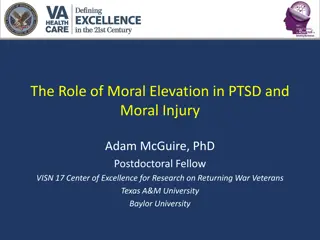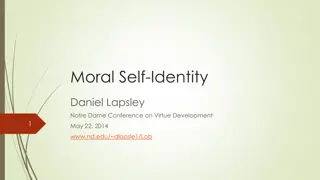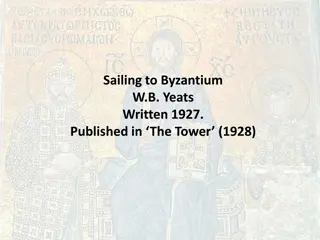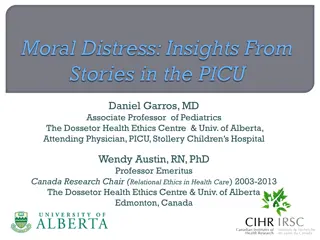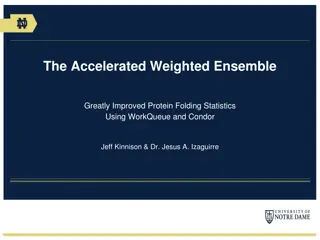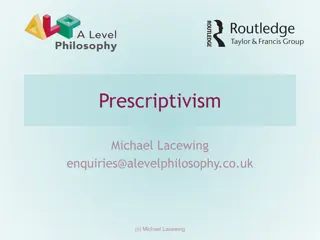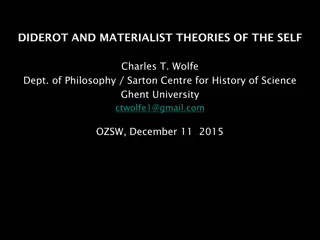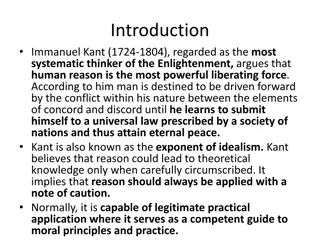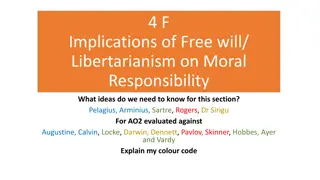Exploring Awe and Self-Transcendence in Moral Character and Selfhood
Delve into the relationship between emotions, personality, and the self, with a focus on awe as a key emotion shaping moral character and selfhood. Discover its conceptual nuances, moral significance, and impact on ethical decision-making, generosity, and prosocial behaviors. Uncover the interconnectedness of awe with subjective well-being, psychological growth, and virtues like gratitude and openness, while considering its uneasy relationship with humility.
Download Presentation

Please find below an Image/Link to download the presentation.
The content on the website is provided AS IS for your information and personal use only. It may not be sold, licensed, or shared on other websites without obtaining consent from the author. Download presentation by click this link. If you encounter any issues during the download, it is possible that the publisher has removed the file from their server.
E N D
Presentation Transcript
Awe and Self-Transcendence Kristj n Kristj nsson Professor of Character Education and Virtue Ethics Jubilee Centre for Character and Virtues University of Birmingham Email: k.kristjansson@bham.ac.uk 1
This conference and the keynoter s dilemma... How do emotions, the personality and the self relate to each other? Is there an emotional self? I have answered this very question in a book where I argue for the claim that emotions constitute the self in the deep sense of both creating it ( la Hume) and sustaining it ( la Aristotle) and argue against the curious moral-identity versus moral- emotion dichotomy about the moral self Dilemma: Either the keynoter revisits his old thesis or says something new. But What do our emotional responses say about us, about our character? 2
Lets talk about awe Want to talk about an emotion that is, ideally, very much part of our moral character and selfhood (who we are deep down ) while pointing beyond the self Neglected by Aristotle and not given a canonical/watershed philosophical treatment by anyone With the aim of: a) Analysing its conceptual contours b) Justifying its salience for moral selfhood (its virtuousness) c) Explaining its uneasy relationship with humility d) Offering some suggestions for emotion education 3
Lots of correlational findings in psychology We have learned how awe is associated with subjective well-being; psychological growth and transformation; lessened existential despair; Big-Five traits of openness and extraversion; love of learning; gratitude; spiritual motivations (among the religious); even lower levels of pro- inflammatory cytokines and with a distinct, universally recognised facial expression Some of those correlations have taken us into the moral sphere, where awe has been shown to be associated with enhanced ethical decision- making, generosity and prosocial values Obviously nothing said here about the intrinsic value of awe! 4
We need to give awe the Aristotelian treatment Aristotelianism has five different assets which render it apt to make sense of the conceptual and moral contours of an emotion. It can (1) potentially place it within a general account of the good life qua flourishing (eudaimonia) why part of good character/moral selfhood (2) explain the intrinsic (not only instrumental) value of virtuous emotions (3) analyse such emotions along the lines of the golden-mean architectonic (4) account for the logical structure/components of emotions (5) offer salient advice on the education of morally valuable emotions But two problems: Aristotle s silence plus the issue of humility 5
Personal experiences for which awe will need to account Hlj aklettar feelings aesthetic ecstasy, mingled with a sense of enormity, oneness and of time standing still, in response to beauty The watch given by my father feelings of moral elevation, in response to goodness The Horizon documentary on infinity feelings of intellectual elevation, in response to profound truth Plato s triad! But contemporary philosophers have not tried to work this into a nuanced, coherent characterisation of awe 6
So the psychologists have just done the conceptual analyses themselves! Keltner and Haidt (2003) prototype analysis, but not of the ordinary social scientific sort: armchair psychology (why inferior to armchair philosophy?) Bonner and Friedman (2011) interpretative phenomenological analysis, but did not conduct interviews themselves, interpreted interpretations of interviews analysed by someone else (I do not want to be seen doing a methodological hatchet job on these two social scientific conceptual analyses here. From a philosophical perspective, the authors in question deserve credit for refusing to rush into measuring awe through simplistic self-report questionnaires, with items such as I often feel awe the standard practice) 7
Keltner and Haidt (2003) Keltner and Haidt (2003) suggest that two appraisals are prototypically central to awe: perception of vastness and a need for accommodation. To elaborate, vastness can involve physical or social size : in fact, anything that is experienced as being much larger than the self, or the self s ordinary level of experience or frame of reference . Accommodation refers to the Piagetian process of adjusting mental structures that cannot assimilate a new experience ; it involves confusion and obscurity to begin with and then a realignment of structures (They talk of those two as necessary conditions!) Five additional themes that may alter or flavour awe experiences: perceptions of threat, beauty, exceptional ability, virtue/strength of character, presumed supernatural causality 8
Critique of Keltner and Haidt Should have distintinguised between vastness and greatness Should have distinguished between personal and transpersonal greatness to distinguish awe from admiration, love, gratitude, reverence directed at persons It seems odd that one of the two necessary conditions is a process set in place by awe rather than an appraisal incorporated in the emotion. What awe may do to existing mental structures is salient, but it is not a cognition on a par with vastness . Furthermore, although awe does, no doubt, in some cases call for the readjustment of mental structures, it may in other cases simply confirm or reinforce existing structures, e.g. ones created by earlier experiences of awe directed at similar targets 9
Bonner and Friedman (2011) 10 themes relating to participants varied experiences of awe: profoundness, connectedness (to something larger than the self), the numinous (referring to the perceived presence of something holy ), fear, vastness, existential awareness, openness/acceptance, ineffable wonder, presence (as the effect of halting the ordinary flow of mental chatter), heightened perception Difficult to compare to K&H: Not necessary conditions, but common themes Qualities of the experience rather than sources of the cognitive consorts 10
Critique of Bonner and Friedman I believe they have identified features of awe that Keltner and Haidt missed, regarding perceptions of profoundness (qua greatness), connectedness, existential awareness and ineffability However, the message they convey is somewhat compromised by of the ambiguity of the term theme in phenomenological analyses, covering anything from potential logical conditions to frequent connotations Like K&H, do not draw on obvious philosophical sources (Plato, Murdoch), nor earlier work in psychology (e.g. Maslow s peak experiences) 11
Proposed characterisation of awe, organised via the parameters of an Aristotelian emotion (1) (2) The subject of awe is the person experiencing it The feeling of awe is intense and predominantly pleasant although it may be slightly tainted with a sense of impending terror (see etymology of awe as gi ) The object of awe is captured by the cognition that the subject is experiencing or has experienced an instantiation of a truly great ideal that is mystifying or even ineffable in transcending ordinary human experiences. This experience is perceived to have increased existential awareness and connected the subject to a greater whole (self-reflexive experience) The target of awe is constituted by the ideals of the famous Platonic triad of truth, beauty and goodness. Depending on whether the target is truth, beauty or goodness, awe presents itself as the more specific emotions of intellectual elevation (for truth), moral elevation (for goodness) or aesthetic ecstasy (for beauty). Awe is thus a term for a general emotional cluster The characteristic desire in awe is that of continuing to experience the emotion or experiencing it again, preferably more profoundly (Awe does not, however, present itself with a distinct behavioural pattern, apart possibly from a common facial expression of blissful surprise) So five necessary conditions.... (3) (4) (5) (6) 12
Aristotle on virtuous emotions Emotional dispositions can, no less than action-dispositions, have an intermediate and best condition [...] proper to virtue when emotions are felt at the right times, about the right things, towards the right people, for the right end and in the right way (NE 1106b17 35). If a relevant emotion is too intense or slack for its present object, we are badly off in relation to it, but if it is intermediate, we are well off (NE 1105b26 28). And persons can be fully virtuous only if they are regularly disposed to experience emotions in this medial way (Talking about emotional hexeis, not episodic emotions) 13
Why no awe? The problem may lie in Aristotle s emotion theory So Aristotle gives a prominent role to emotions in the actualisation of eudaimonia When one looks at the emotions that Aristotle describes, however, those fall broadly into three categories with respect to their targets: emotions directed at oneself (like pride), at other people (like compassion) or at external events (like fear). Notably missing from this list are any emotions directed at ideals or idealisations, such as beauty, truth and goodness in the abstract. There is no awe either inspired by a heightened sense of beauty in art/nature, the mystic immensity of the universe or the unconditional goodness of an act of self-sacrifice Aristotle does not appreciate the relevance for flourishing of what Maslow saw as top-of-the-pyramid peak experiences 14
Is the Aristotelian account of flourishing flat and disenchanted ? It is sometimes complained that some sides of human nature are largely unexplored by Aristotle, sides such that, in addition to being rational, we are also spiritual beings, responsive to beauty, imaginatively creative, without awareness of which any account of human nature becomes deflated and incomplete Latter-day theorists have identified those missing parts in human beings deep-seated orientation or urge sometimes referred to as a transcendent urge towards extraordinary, idealised experiences of the true, good and beautiful. This urge is revealed in the inter-human aesthetic impulse and a strong drive towards some sort of spirituality. One could even argue that the desire for getting high on drugs especially psychedelic drugs has the same psychological (or biological) origin Here, Aristotelianism lags behind Confucianism with its aesthetic appreciation of Heaven (Ti n) and the Way (D o) 15
Three responses in Aristotles defence Because the Rhetoricis just about orators tools of persuasion (But why would eliciting awe not persuade?) Path just about social-status emotions (But what about fear of non- persons?) Aristotle did actually celebrate awe but he just called it wonder (thaumazein) as he did not have a specific Greek word for awe (But he specifies various emotions that do not have Greek words, and wonder is quite different from awe: refers to deep non-self-reflexive interest, often accompanied by flow but without heightened existential awareness. Moreover, another contender, contemplation (theoria), lacks the sensuous aesthetic intensity of awe 16
Awe as an Aristotelian virtuous emotion Awe, as a virtuous emotion, would have to be felt towards the proper instantiations of the ideals of the good, true and beautiful (although it could accommodate pluralistic views about the relative worth of those values); awe at debauchery or sadism obviously does not count More generally, for awe to count as virtuous, its necessary conditions need to satisfy stringent constraints of representational fittingness and moral justifiability With respect to the quantitative mean, it is obviously not good to be in a state of constant rapture; that sort of aestheticism on steroids would count as the excess-extreme of awe. The deficiency-extreme would be constituted, however, by the insipid philistinism of those incapable of experiencing awe towards the right objects when the occasion calls for it. To be in a qualitative mean, awe would obviously also have to be felt for the right reasons, in the right manner, for the right length of time, etc. 17
Counter-argument about humility A central theme in much of the psychological literature on awe which connects awe to (a) a diminished sense of individual selfhood, and/or (b) humility (as opposed to pride/self-enhancement values), where (a) and (b) are often, but not always, spliced together This theme is sometimes expressed as if humility is a logical implication of the cognitions constituting awe; more often than not, however, it is expressed via an empirical thesis, according to which awe contributes, as a matter of fact, to a sense of a small self which, in turn, explains awe s positive effects on prosociality In either case, this theme does not augur well for an Aristotelian analysis of awe s moral worth; after all Aristotle was no admirer of a small self , and humility is often categorised as an Aristotelian vice (mikropsychia): thinking oneself worthy of less than one is worthy of 18
A possible Aristotelian response The meaning of humility has shifted (in the secular/psychological discourse) from underestimation of worth to non-overestimation of worth, and the latter was an Aristotelian virtue, in a golden mean between arrogance/vanity and mikropsychia (pusillanimity) (Why not simply call it modesty then?) Perhaps there is a role, given Aristotle individualisation-of-virtue thesis, for humility as a corrective virtue, dragging the vain down to realistic self-assessment, just as pride is a corrective virtue, dragging the pusillanimous up to realistic self-assessment In any case, this new understanding of humility does not threaten an Aristotelian conception of awe 19
But a further complication about humility Often does not seem to refer to moral humility but to a view of the lessened ontological status of the self in the grand scheme of things The one-sided questionnaires: I feel very small or insignificant ; I feel the presence of something greater than myself ; I feel part of some greater entity ; I feel like I am in the presence of something grand => social desirability bias??? Why not my conflicting intuition: How wonderful that I exist and I am not just this little dot here; I am part of a greater whole; I am truly important in the grand scheme of things; I am unbounded rather than buffered; just think how every small movement I make with my little finger creates waves that carry ripple effects to the outskirts of the universe ? 20
Confusions about emotions and self. Self-transcendent emotion: The object/immediate target not the self (as opposed to self-conscious emotions). (a) Horizontally self-transcendent (e.g. compassion). (b) Vertically self-transcendent/transpersonal. Awe is (b) Self-reflexive emotion: An emotion that involves existential awareness of the connection of the self to the immediate target. Awe is self-reflexive in this way Self-comparative emotion: An emotion that compares the self with the target (as large or small, relevant, irrelevant). Awe is not necessarily self- comparative, and even when it involves comparisons, could yield big fish in a big pond perception, rather than small fish in a big pond All in all = Neither understanding of the small-self-and-awe thesis undermines awe as a putative Aristotelian virtuous emotion 21
The educational component Famously, Aristotle claimed that the purpose of moral inquiry is not to know what virtue is, but to become good, since otherwise the inquiry would be of no benefit to us (NE 1103b27 29) In Aristotelianism, virtue education is not an extraneous addition to an understanding of morality or the study of moral philosophy it is, rather, what such understanding and study are all about and educating the virtues is more than anything, at the beginning at least, a process of sensitisation to proper emotions Ideally, from an Aristotelian perspective, then, a paper on the moral justification of a virtuous emotion should culminate in educational advice on how it can be cultivated 22
John Whites warning signals! Eminent educational philosopher John White is hesitant to expand the standard conception of flourishing to include awe. Indeed, he devotes a whole chapter in his book (Exploring Wellbeing in Schools, 2011, chap. 12) to demonstrating that all the depth we need in order to live well can be achieved within an explicitly mundane view of flourishing. Revelling in disenchantedness, his main foils are anything spiritual and other-worldly White sounds warning signals about taking children down the will o the wisp road towards awe. He worries that, given children s penchant for the supernatural and otherworldly, feeding them material on transcendence will nourish that urge and lead them further away from finding this-worldly answers to life s greatest questions. They should be introduced to wonder but not to awe proper, as the latter has indelible religious connotations The danger is that White throws the baby out with the bathwater. Not to see anything irreducibly awe-inspiring in the workings of the universe the singularity of a black hole; the possibility of endless parallel worlds involves a concession to philistinism (although White himself is clearly anything but a philistine, with his constant reminders to schools to expose children to art and culture) 23
Is White right? Which of the two poems.... Do not ask your children ...resonates more with you? My mother lived in an earthen hut to strive for extraordinary lives. She could kindle Christmas with a little candle Such striving may seem admirable, Once the fairy queen showed her but it is the way of foolishness. Help them instead to find the wonder Her palace and the marvel of an ordinary life. And forever after its beauty Show them the joy of tasting Lived on in the eyes of that woman tomatoes, apples and pears. I was allowed to peek Show them how to cry when pets and people die. Under her arm Show them the infinite pleasure in the touch of a hand. (Fr Dj pal k, 1977, p. 24) And make the ordinary come alive for them. The extraordinary will take care of itself. (Martin, 1999, chap. 35). 24
(1818: Caspar David Friedrich, Wanderer above the Sea of Fog) Will the extraordinary just take care of itself? 25





